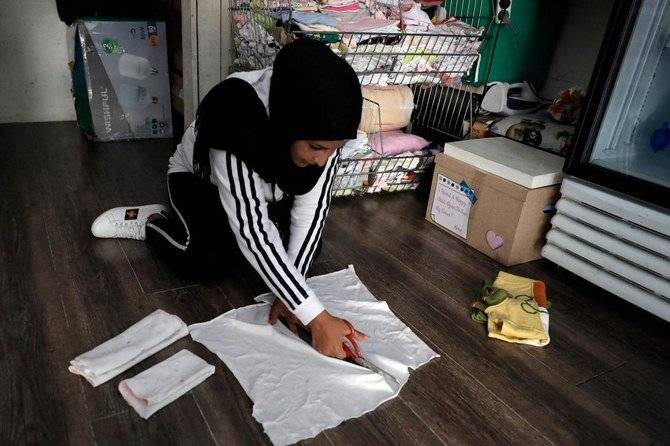
A woman cuts makeshift sanitary pads. (Credit: AFP)
BEIRUT — Seventy-seven percent of women and girls surveyed by Lebanese feminist collective Fe-Male are having difficulty accessing menstrual products due to a steep rise in prices, a study released today by Fe-Male and NGO Plan International says.
The study is the latest in a series of reports marking growing levels of period poverty over the last year, as inflation soars and people who menstruate struggle to afford the pads, tampons and panty liners they need to manage their periods safely.
“Unfortunately, period poverty has become a reality in Lebanon and it has many negative impacts and direct damages on the sexual and reproductive health of women and girls,” said Alia Awada, Fe-Male’s co-director. “This issue has a direct negative impact on women’s dignity and leads to their increased sense of insecurity during menstruation.”
According to the research, 42 percent of the 1,800 women and girls interviewed have either reduced the number of pads used during their periods or used them for a longer time, which can increase the risk of infection. Thirty-six percent said they had experienced physical symptoms, such as allergies or infections, after they made changes to the products they use, and another 43 percent said they had suffered added anxiety and stress.
“The deteriorating situation in Lebanon and its negative impact on adolescent girls and women is a big concern … especially with the increasing number of women and girls who are using unsafe alternatives to sanitary pads,” said Lama Naga, the manager of the sexual and reproductive rights programs at Plan International.
According to research conducted by the United Nations Population Fund (UNFPA) published earlier this year, menstruating individuals have begun using alternatives such as baby diapers, towels or rags.
“I don’t have enough money to buy pads, I prefer to get food for my baby,” said one woman interviewed by Fe-Male. Instead, “I always put a piece of cloth over my underwear, and this gave me a lot of problems.”
Nearly 90 percent had changed their purchasing behavior for menstrual products because of the increase in prices.
Year-on-year inflation for goods and services was recorded at 120 percent in May, meaning costs have more than doubled on average. In the summer of 2020, packets of 10 Nana sanitary pads — one of the most popular brands — were being sold for between LL4,000 and LL6,000. Now, the same packet sells for between LL16,000 and LL20,000.
Fe-Male and Plan International’s joint study comes as part of a national campaign by the two organizations called #Nashftolna_dammna, which literally translates to “you dried up our blood,” but is usually an idiom meaning “you drained us.” The campaign is seeking to raise awareness of the repercussions of period poverty and push the Lebanese government and other stakeholders to find long-term solutions.
Last week, during a session devoted to period poverty, the head of Parliament’s Women and Child Committee MP Inaya Ezzeddine (Amal/Sur) said that committee members and the Industry Ministry were exploring ways to boost local production of sanitary products.
A girl interviewed by Fe-Male said she had to miss several days of school each month when she got her period because she did not have access to sanitary pads.
“My family can’t afford them,” she said, “so my mom taught me how to replace them with a piece of cloth.”